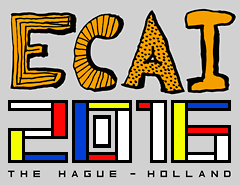 Hello Community! We are very pleased to announce that two of our papers were accepted for presentation at the biennial European Conference on Artificial Intelligence (ECAI). ECAI is Europe’s premier venue for presenting scientific results in AI and will be held from August 29th to September 02nd in The Hague, Netherlands.
Hello Community! We are very pleased to announce that two of our papers were accepted for presentation at the biennial European Conference on Artificial Intelligence (ECAI). ECAI is Europe’s premier venue for presenting scientific results in AI and will be held from August 29th to September 02nd in The Hague, Netherlands.
In more detail, we will present the following papers:
An Efficient Approach for the Generation of Allen Relations (Kleanthi Georgala, Mohamed Sherif, Axel-Cyrille Ngonga Ngomo)
Abstract: Event data is increasingly being represented according to the Linked Data principles. The need for large-scale machine learning on data represented in this format has thus led to the need for efficient approaches to compute RDF links between resources based on their temporal properties. Time-efficient approaches for computing links between RDF resources have been developed over the last years. However, dedicated approaches for linking resources based on temporal relations have been paid little attention to. In this paper, we address this research gap by presenting AEGLE, a novel approach for the efficient computation of links between events according to Allen’s interval algebra. We study Allen’s relations and show that we can reduce all thirteen relations to eights simpler relations. We then present an efficient algorithm with a complexity of O(n log n) for computing these eight relations. Our evaluation of the runtime of our algorithms shows that we outperform the state of the art by up to 4 orders of magnitude while maintaining a precision and a recall of 100%.
Towards SPARQL-Based Induction for Large-Scale RDF Data sets (Simon Bin, Lorenz Bühmann, Jens Lehmann, Axel-Cyrille Ngonga Ngomo)
Abstract: We show how to convert OWL Class Expressions to SPARQL queries where the instances of that concept are — with restrictions sensible in the considered concept induction scenario — equal to the SPARQL query result. Furthermore, we implement and integrate our converter into the CELOE algorithm (Class Expression Learning for Ontology Engineering). Therein, it replaces the position of a traditional OWL reasoner, which most structured machine learning approaches assume knowledge to be loaded into. This will foster the application of structured machine learning to the Semantic Web, since most data is readily available in triple stores. We provide experimental evidence for the usefulness of the bridge. In particular, we show that we can improve the runtime of machine learning approaches by several orders of magnitude. With these results, we show that machine learning algorithms can now be executed on data on which in-memory reasoners could not be use previously possible.
Come over to ECAI and enjoy the talks. For more information on the conference program and other papers please see here.
Sandra on behalf of AKSW
